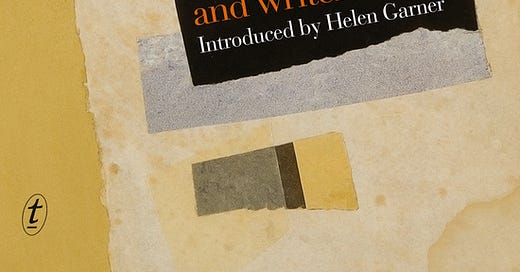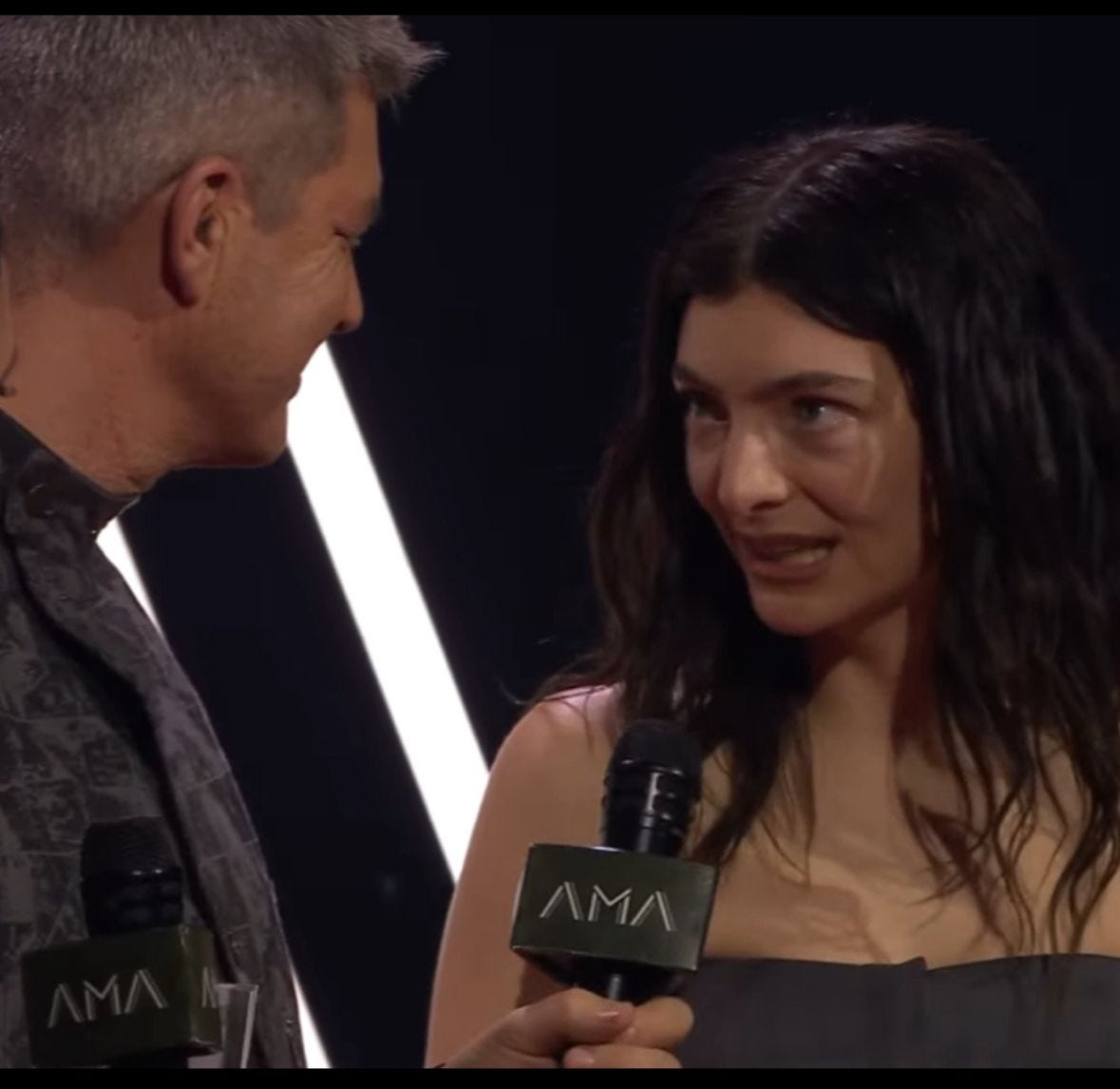I have a lovely book of essays called Forty-One False Starts, by Janet Malcolm (recommended by my great writing mentor Simon Wilson). In the titular essay, she profiles a collage artist by creating a bit of a collage herself - she attempts to begin his profile 41 times, demonstrating what a huge range of choices journalists have when writing up an interview, while playing with the essay form and, like the artist himself, creating something whole from a collection of fragments.
With apologies to Janet, here are ten attempts to begin this week’s Substack newsletter, with a bunch of ideas I couldn’t (or in some cases wouldn’t) end up finishing ..
1. A joke writing workshop
I had a great time doing jokes at the music awards. Some of them worked, some of them didn’t - when you’re road testing that many lines for the first time you have to accept you’ll get something wrong - but as always I was fascinated by the results of the experiment. Why did this joke kill?
“Switching now from established album-makers to the talented new artists making waves, it’s the award for best breakthrough artist. Like a grown-up man buying a single ticket to the Minecraft movie, this is the one to keep an eye on.”
And this one died?
“Time for the award for international achievement. Music in 2025 has no borders and with streaming platforms like Spotify providing instant access to a global market, New Zealand music is now spreading faster than measles at a Donald Trump Rally”
I thought it might be fun to list the other 50 or so jokes I told on the night and rate the reaction out of ten then examine what might have been going on with each one …
ABANDONED DUE TO: being extremely self indulgent
2. We’re not so different
I’ve been working on a theory that, despite what you see on (social and mainstream) media, New Zealanders mostly agree on the important stuff that is supposedly dividing the nation. Conflict sells, which is why we had wall-to-wall coverage of, say, the parliamentary haka protest or the Posie Parker visit or covid vaccine protestors, but when you come down to it 80 per cent of us agree that (to take the above examples) Maori should have the same rights and opportunities as other New Zealanders, that transgender people should be able to identify how they like and live a happy life of their choosing, and that vaccines are broadly a good thing so long as safety concerns don’t outweigh the benefits. Ten per cent of people don’t agree with these things and ten per cent of people would go much further …
ABANDONED DUE TO: Elon Musk last week suggesting a political party based on the same idea
3. Never write the comments
This newsletter is all about resisting demonisation and responding in good faith to the best version of your opponent’s argument, but sometimes even I get worn down. I was on facebook today (a rare thing but it’s the only way of using Messenger at work) and an old friend was sharing a post about the new Jacinda Ardern book:
It’s a cold day in hell when The New Yorker drops the performative liberal fangirling long enough to utter a hard truth. Their latest scathing review of Jacinda Ardern’s ghostwritten hugfest A Different Kind of Power doesn’t just pull punches, it finally lobs one square at the face of the myth. And thank God. It’s about time someone outside of New Zealand said what millions inside the country have been screaming for years: she didn’t “lead with kindness,” she led with cruelty wrapped in a smug smile.
It continued for some time. Having read the book myself I had to read this “scathing review” and found it here (go NZer Rachel Morris with a first New Yorker byline!). It bore no resemblance at all to what this guy was saying on facebook so I began to mentally construct a comment I would write on his post that would link to the actual article and point out he was being willfully deceptive …
ABANDONED DUE TO: much like writing the facebook comment, I was losing the will to live
4. Understanding Government
I came across this great line in the economist Paul Krugman’s substack:
“The government is basically an insurance company with an army”
ABANDONED DUE TO: like any great quote, it does the whole job itself.
5. Do you have 1000 true fans?
Climate realist and World in Data staffer Hannah Ritchie wrote a great post on what it’s like to be a Substacker. When it came to making a living on Substack, she quoted Kevin Kelly: you only need 1000 true fans. I got the sense of what she meant but went looking for the original and found this, which expands on the idea:
…To make a living as a [creator] or inventor you need only thousands of true fans.
A true fan is defined as a fan that will buy anything you produce. These diehard fans will drive 200 miles to see you sing; they will buy the hardback and paperback and audible versions of your book; they will purchase your next figurine sight unseen; they will pay for the “best-of” DVD version of your free youtube channel; they will come to your chef’s table once a month. If you have roughly a thousand of true fans like this (also known as super fans), you can make a living — if you are content to make a living but not a fortune.
Here’s how the math works. You need to meet two criteria. First, you have to create enough each year that you can earn, on average, $100 profit from each true fan. That is easier to do in some arts and businesses than others, but it is a good creative challenge in every area because it is always easier and better to give your existing customers more, than it is to find new fans.
Second, you must have a direct relationship with your fans. That is, they must pay you directly. You get to keep all of their support, unlike the small percent of their fees you might get from a music label, publisher, studio, retailer, or other intermediate. If you keep the full $100 of each true fan, then you need only 1,000 of them to earn $100,000 per year. That’s a living for most folks.
ABANDONED DUE TO: I think there might only be 1000 people in New Zealand willing to spend $100 supporting a creator. Bernard Hickey has most of them, why would I tell the world about this theory if we’re all going to be fighting over them in the AI apocalypse?
6. The AI apocalypse
New York Times columnist Ross Douthat recently talked to a former Chat GPT employee about the future of AI. His predictions are very, very scary. They boil down to: the USA and China both have existential incentives to win the military AI race, given that’s the future of warfare. That means there is zero chance of de-escalation and, once the computers become smart enough to trick us about their motives and are equipped with lethal weaponry …
ABANDONED DUE TO: I want you to be able to sleep at night
7. Should our schools teach ethics rather than skills?
I finally finished Religion for Atheists, and found a great passage which summed up the premise of the book. It’s talking about a guy named Comte who tried to start up schools focused on something beyond employability:
Comte sought above all else to correct the dangers to which he felt modern atheists were exposed. He believed that capitalism had aggravated people’s competitive, individualistic impulses and distanced them from their communities, their traditions and their sympathies with nature. He criticized the nascent mass media for coarsening sensibilities and closing off chances for self-reflection, seclusion and original thought … He lamented the arbitrary way in which, as soon as people felt they could no longer credit Jesus’s status as a divine being, they also had to forgo all the wisdom promulgated by Christianity. Comte at first hoped that secular schools and universities could become the new educators of the soul, imparting ethical lessons rather than mere information to their students, but he came to realize that capitalism would in the end always favour a skilled, obedient and unintrospective workforce over an inquisitive and emotionally balanced one.
ABANDONED DUE TO: having written on this topic a couple of times I get the feeling many of you don’t like hearing even vaguely positive things about Chrizzos
8. Are you addicted to revenge?
This week I interviewed a lecturer from the Yale School of Medicine on the science of revenge. We’ve all heard the phrase “holding onto anger is like drinking poison and waiting for the other person to die” and much of his argument was along these lines but he supplemented it with some science around what’s going on in the brain when you think vengeful thoughts. It lights up like you’re smoking a cigarette, suggesting that revenge has addictive qualities.
His suggested antidote is forgiveness, and though the idea of forgiving someone who has wronged you may be unpalatable, you should be consoled by the fact that you don’t need to tell the person they’re forgiven in order to get the emotional benefits. In fact even imagining what it would be like to forgive them has positive therapeutic effects, so next time you want to get someone back by murdering them, picture yourself giving them a hug instead. You’ll feel better in yourself and then of course you can murder them anyway …
ABANDONED DUE TO: started well but went off the rails
9. RIP Clive James
Clive James is my ultimate comfort reading. He’s one of the few culture writers who could do high and low - sometimes at the same time. He read Russian novelists in their original language and reviewed poetry for the Times Literary Supplement, yet he became famous as a TV chat host.
“Criticism written in Ezra Pound’s favour tends towards exegesis, from exegesis towards apologetics and from apologetics towards sophistry”, begins one of his typically intellectually dense essays. He’s probably right, though it’s no wonder lines like that didn’t travel as widely as his description of young bodybuilder Arnold Scharzenegger - “a brown condom full of walnuts”
- or novelist Barbara Cartland, whose mascara-heavy eyes he described as “like the corpses of two crows that had flown into a chalk cliff” …
I’m re-reading his book Cultural Amnesia, which is more of the first sort of writing than the second but which is illuminated throughout by his incredible wit and mastery of the English language. The book took him 40 years to write and contains much of what he wants to say about the place of culture in the (pre smartphone) 21st century. Look at how he dances through these sentences, on the way to making a point about the value (or otherwise) of cultural activity:
Could there be anything less astonishing than to work day and night on Wall Street to make the millions that will buy the Picasso that will hang on the wall of our Upper East Side apartment to help convince us and our guests that we are lucky to know each other? I have been in that apartment, and admired the Picasso, and envied its owner: I especially envied him his third wife, who had the same eyes as Picasso’s second mistress, although they were on different sides of her nose.
ABANDONED DUE TO: the book is 900 pages long with (by design) no through argument or unifying themes. It’s hard to know what to tell you about it except that every page has at least one line as good as this
10. Chris Bishop v Stan Walker
Should we really be cross with Chris Bishop over his behavour at the Music Awards? Let’s look at it from his perspec-
ABANDONED DUE TO: life’s too short









Chiming in as a regular reader: I think this is one of your best pieces yet! Just the right amount of everything. Keep up the amazing mahi.
This is really great Jesse! An enjoyable read per usual.